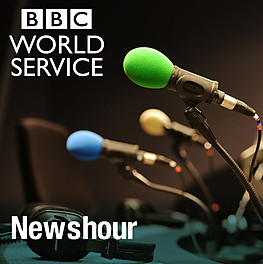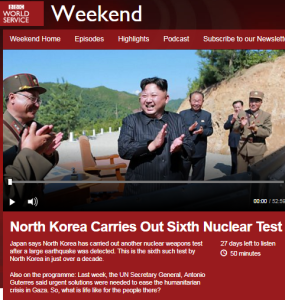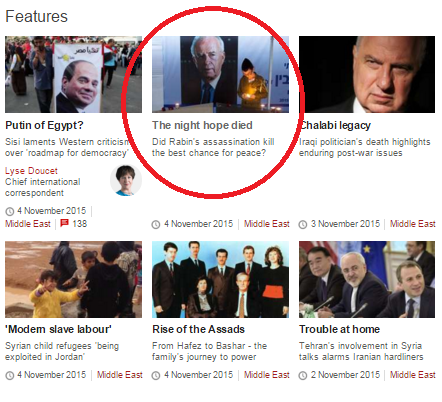Over the past few weeks we have documented some of the BBC’s coverage of the ‘Great Return March’ events that began at the end of March. Between March 30th and early May, BBC reporting was sporadic but as the anticipated May 14th climax approached – and with it the chance to promote the notion of linkage between the pre-planned events along the Gaza Strip-Israel border and the opening of the US embassy in Jerusalem – the pace of coverage increased, as the examples below demonstrate.
Tuesday, May 8th:
BBC Radio 4, ‘Today’, (from 02:18:25 here) interview by Mishal Husain with the Israeli Ambassador to the UK, Mark Regev.
Husain: “Why are your soldiers using live ammunition to shoot people on the other side of the fence? [….] The Israeli rights group Adalah […] says that […] there’s been systematic use of live fire with no justification.”
Wednesday, May 9th:
BBC World Service, ‘Newshour’ with James Coomarasamy (from 0:14:00 to 0:20:30 here) discussed here
Friday, May 11th:
BBC Radio 4, ‘Today’: live broadcast from Jerusalem with Martha Kearney (from 08:09 here)
Sunday, May 13th:
BBC Radio 4, ‘Sunday’: broadcast from Jerusalem with Edward Stourton (from 00:13 here)
BBC World Service, ‘Weekend’ with Julian Worricker (from 04:40 here) discussed here
BBC World Service, ‘Newshour’ with James Coomarasamy (from 00:53 here)
Monday, May 14th: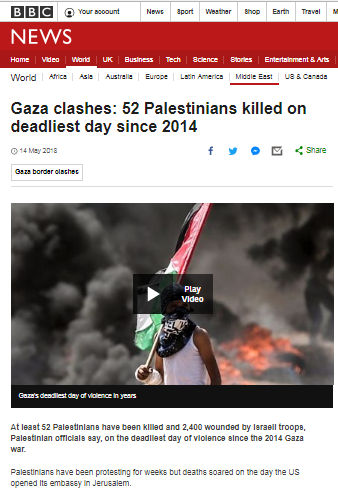
BBC World Service, ‘Newsday’: live broadcast from Jerusalem (here)
BBC News website: “Gaza clashes: 52 Palestinians killed on deadliest day since 2014” – discussed here
BBC News website: “As it happened: Gaza protest violence”
BBC Radio 4, ‘Today’: with Justin Webb and John Humphrys (from 0:34:00 to 0:38:15, from 1:48:30 to 1:57:30 and from 2:43:30 to 2:48:30 here)
BBC Radio 4, ‘World at One’ with Sarah Montague (from 0:01:00 to 0:02:30 and from 0:07:00 to 0:17:35 here)
BBC World Service, ‘Newshour’ with Razia Iqbal (from 0:00:00 to 0:13:00, from 0:14:00 to 0:20:45, and from 0:30:00 to 0:49:30 here) – discussed here, here, here and here
BBC World Service, ‘Newshour’ with Julian Marshall (from 00:11 to 0:23:00 and from 0:26:30 to 0:42:45 here)
Marshall: “At 4pm local time the United States officially moved its embassy in Israel to Jerusalem. As the ceremony took place, more than 50 Palestinians protesting in Gaza were killed by Israeli forces.”
BBC World News, ‘Beyond 100 Days’ with Katty Kay and Christian Fraser (from 0:01:28 to 0:13:15 and from 0:31:00 to 0:41:30 here)
BBC Two, ‘Newsnight’ with Mark Urban (from 0:01:30 to 0:11:00 here)
Tuesday, May 15th:
BBC News website “Gaza’s deadliest day of violence in years“.
“Dozens of Palestinians have been killed and thousands wounded by Israeli troops, Palestinian officials say, on the deadliest day of violence since the 2014 Gaza war.
The violence came as the US opened its embassy in Jerusalem, a move that has infuriated Palestinians.”
BBC News website: “‘Hear our message’: Gaza border violence in pictures” – discussed here
BBC News website: “What’s at the root of the protests in Gaza?” by Jeremy Bowen – discussed here
BBC News website: “Gaza begins to bury its dead after deadliest day in years“
BBC News website: “Gaza violence: Israelis and Palestinians in fierce exchanges at UN“
BBC News website: “May urges ‘greater restraint’ by Israel after Gaza violence“
BBC Radio 4, ‘Today’, presented by Martha Kearney and Nick Robinson (from 0:07:45 to 0:08:30, from 0:10:15 to 0:13:00, from 0:48:15 to 0:54:15, from 1:09:00 to 1:13:30, from 2:10:00 to 2:21:30, and from 2:38:15 to 2:42:15 here)
“Palestinian officials say nearly 60 people died in Gaza yesterday, when Israeli forces opened fire as America opened its new embassy in Jerusalem.”
BBC Radio 4, ‘World at One’, with Sarah Montague (from 0:01:10 to 0:02:20 and from 0:07:00 to 0:17:30 here)
“Funerals have been taking place for many of the Palestinians killed during protests along the Gaza Strip’s border with Israel yesterday. The United Nations Human Rights office has condemned what it called the appalling deadly violence by Israeli forces who killed nearly 60 people.”
BBC World Service, ‘Newshour’ with Razia Iqbal (from 0:00:00 to 0:12:45 and from 0:30:00 to 0:42:45 here)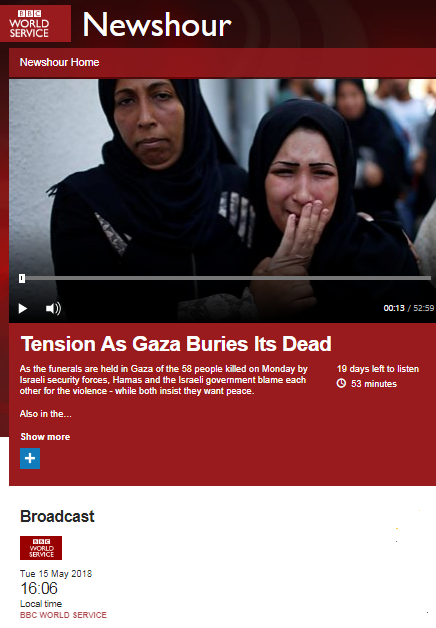
“As the funerals are held in Gaza of the 58 people killed on Monday by Israeli security forces, Hamas and the Israeli government blame each other for the violence – while both insist they want peace.”
BBC World Service, ‘Newshour’ with Julian Marshall (from 0:00:40 to 0:14:00, from 0:30:00 to 0:43:00 and from 0:45:00 to 0:50:10 here)
BBC World Service, BBC OS, “What’s it like living in Gaza?“
BBC Radio 4, ‘PM’ with Eddie Mair (from 0:01:00 to 0:02:15 and from 0:05:30 to 0:17:30 here)
BBC Radio 4, ‘The World Tonight’ with Ritula Shah (from 0:00:00 to 0:02:30 and from 0:07:45 to 0:23:45 here)
BBC World News and BBC 4, ‘Beyond 100 Days’ with Katty Kay and Christian Fraser (from 0:01:00 to 0:13:20 here)
Wednesday, May 16th:
BBC Radio 4, ‘Today’, presented by Martha Kearney and Nick Robinson (from 1:12:00 to 1:15:45 and from 2:43:00 to 2:44:45 here).
“The Arab League will hold emergency talks today, with some members calling for Israel to be taken to the International Criminal Court, for the massacre of 59 Palestinians at the border with Gaza on a single day.” [emphasis added]
BBC Radio 4, ‘World at One’ with Sarah Montague (from 0:25:00 to 0:31:45 here) – discussed here
BBC News website, BBC One ‘News at 10’, BBC News Channel, “Gaza: The bullets stop, the burials go on” by Jeremy Bowen – discussed here.
BBC News website: “Gaza: The history behind the anger” by Paul Adams
On the day of the violent events that prompted so much BBC coverage – May 14th – the Palestinian Islamic Jihad announced that three of those killed belonged to its terror organisation. The following afternoon – May 15th – Hamas put out a ‘martyrdom poster’ for ten members of its internal security apparatus also killed in the May 14th incidents.
On the afternoon of May 16th reports emerged concerning an interview given by Hamas’ Salah Bardawil to a local TV channel.
“A Hamas official on Wednesday acknowledged that 50 of the 62 Palestinians reported killed during Gaza border riots on Monday and Tuesday were members of the Islamist terrorist group, bringing the total number of known members of terror groups among the fatalities up to 53.
“In the last rounds of confrontations, if 62 people were martyred, Fifty of the martyrs were Hamas and 12 from the people. How can Hamas reap the fruits if it pays such an expensive price?” said Hamas official Salah Bardawil in an interview with the Palestinian Baladna news outlet.
Questioned about the figures by the presenter, Bardawil said they were “official.”
“I am giving you an official figure. 50 of the martyrs in the recent battle were from Hamas,” he said.”
Also on May 16th, Hamas leader Yahya Sinwar gave an interview to Al Jazeera in which he admitted that “many” of those involved in the May 14th incidents “took off their military uniforms” and went on to say:
“When we decided to embark on these marches, we decided to turn that which is most dear to us – the bodies of our women and children – into a dam blocking the collapse in Arab reality, a dam to prevent the racing of many Arabs towards the normalization of ties with the plundering entity, which occupies our Jerusalem, plunders our land, defiles our holy places, and oppresses our people day and night.”
In other words, by late afternoon on May 16th it was known that fifty-three of the 62 people reported killed on May 14th had been claimed by the terror organisations Hamas and Islamic Jihad. One would of course have expected the BBC to have given that information equal prominence to its repeated claims of a “massacre” and “slaughter” of “Palestinian protesters”.
However, at that point the BBC did a disappearing act.
On May 16th the BBC News website published an article titled “Did Israel use excessive force at Gaza protests?” which makes no mention of the fact that the vast majority of those killed were members of terror groups [ see ‘updates’ below] and BBC World Service and domestic radio programmes dropped all coverage of the story.
So perhaps the BBC was not aware of the fact that over 85% of those killed had been claimed by terrorist organisations? In an edition of the BBC World Service radio programme ‘Newshour’ aired on May 18th – presented by Jon Donnison (from 17:14 here) – we discover that the corporation was perfectly aware of Bardawil’s statement.
Donnison: “Now the UN’s Human Rights Council has voted for an independent investigation into the killing of dozens of Palestinian protesters by the Israeli forces in Gaza this week. Health officials in Gaza say 60 people were killed by Israeli forces on Monday and a further 2,700 Palestinians injured, many of them with live fire. A Hamas official has said 50 of those killed were from the Islamist group which is in power in the territory. Israel has insisted that its response to the protests was proportionate but that is not the view of the UN Human Rights Commissioner Zeid Ra’ad Al Hussein who said Israel’s actions were wholly disproportionate. He called for an end to Israel’s occupation of the Palestinian territories.” [emphasis added]
Nevertheless, on May 22nd the BBC News website published an article titled “Palestinians demand full ICC investigation into ‘Israeli war crimes’” in which it failed to state that the majority of those killed on May 14th had been claimed by terror groups while continuing to promote the notion that they can be described as “unarmed civilians”.
“Palestinian President Mahmoud Abbas accused Israel of carrying out “massacres” of unarmed civilians. But Israel’s Prime Minister Benjamin Netanyahu insisted its troops acted in self-defence and blamed the militant group Hamas, which orchestrated the protests, for the deaths.” [emphasis added]
The public purposes laid down in the BBC’s charter oblige it to provide its audiences with “accurate and impartial news, current affairs and factual programming of the highest editorial standards”. In order to meet that obligation the BBC would have had to inform audiences of the fact that Hamas and the Palestinian Islamic Jihad had claimed a very high proportion of those the BBC spent days describing as “protesters” on multiple channels and platforms.
Significantly, it failed to do so.
Update:
A reference to Bardawil’s statement appeared at the end of an article published on the BBC News website on May 18. A qualified reference to the statement was added to the article titled “Did Israel use excessive force at Gaza protests?” the day after its initial publication.


